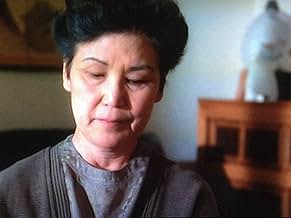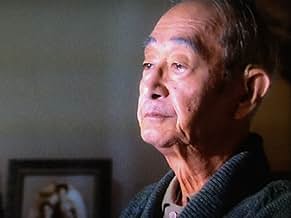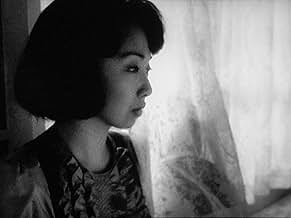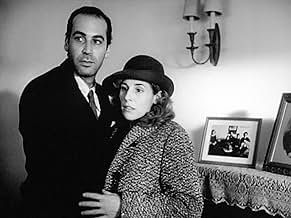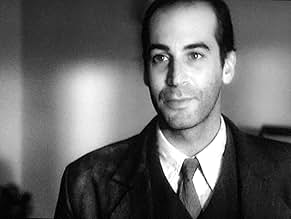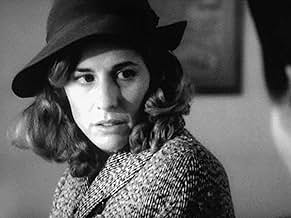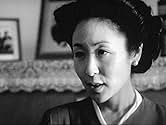Europe, 1940. For thousands of Jews, a Japanese diplomat and his wife defy Tokyo and the Nazis, and offer visas, for life.Europe, 1940. For thousands of Jews, a Japanese diplomat and his wife defy Tokyo and the Nazis, and offer visas, for life.Europe, 1940. For thousands of Jews, a Japanese diplomat and his wife defy Tokyo and the Nazis, and offer visas, for life.
- Won 1 Oscar
- 9 wins & 7 nominations total
- Director
- Writers
- All cast & crew
- Production, box office & more at IMDbPro
Storyline
Did you know
- TriviaHanni Vogelweid (Sondheimer), who makes a "Special Appearance" as Elderly Woman at Interview, received a life-saving visa from Sugihara when she was 17 years old, which allowed her to escape Lithuania with her family in 1940. She helped with research for the film by sharing family photos and talking about her experience. She passed away in 2006.
- GoofsAlthough Shizuko Hoshi performed the scripted voice-over narration for the film (as an elderly Mrs. Sugihara), there are three lines of narration that are not her voice, but instead are spoken by Susan Fukuda (who plays younger Mrs. Sugihara). This was due to an error by the director, Chris Tashima, during post production. Tashima had always intended to have Hoshi provide narration throughout. During principal photography, sound mixer Yehuda Maayan recorded a temp track of Fukuda reading all of the voice over lines, so that editor Irvin Paik would have an audio track to cut with in editing. Later in post production, a recording session was arranged with Hoshi, and Tashima made a dialogue cue sheet of all the narration lines for Hoshi to record from. However, he missed three lines from the script. It was only discovered in final sound editing that the three lines were never recorded by Hoshi. With a completion date nearing, it was decided to go with takes from Fukuda's temp track (to save time). As it turns out, in the finished film, Tashima felt it actually works very well, since the three lines that are spoken by Fukuda are heard during the 1940 scenes in Lithuania (where Fukuda is also onscreen), and, as a more subtle audio transition, it helped the audience ease back into 1985 (when Hoshi is heard in closing narration).
- Quotes
Yukiko Sugihara: Even a hunter cannot kill a bird which flies to him for refuge.
- Crazy credits73 year old cast member Hanni Vogelweid is listed under a 'Special Appearance' section. Her appearance was special because she was a real-life visa recipient of Mr. Sugihara's, when she was 17 years old.
- ConnectionsFeatured in KCAL 9 News: Episode dated 21 May 1997 (1997)
Featured review
If you get a chance to see this film, grab it!
I saw "Visas and Virtue" the week after it won the Academy Award for best live action short, and there wasn't a dry eye in the house by the time it ended. With good reason: In telling the story of the Japanese consul in Lithuania who, against the orders of his government and at great personal risk, continued to grant transit visas to Jews fleeing Hitler, the film makers touch several deep places; it is difficult to resist the emotional pull of the themes they explore.
Beautifully shot, mostly in black and white, the story is told both richly and economically. Crammed into about half an hour are such story threads as how the consul and his wife carefully arrange the interviews so that the rules are technically followed, how the stress of both the external crisis of war and refugees and the internal one of personal honor and loyalty and right action affects their family, and the desperation and gratitude of the people who are helped and who, unexpectedly, can help him.
It's a great shame that a short film like this won't be seen by the large audience it deserves.
I saw "Visas and Virtue" the week after it won the Academy Award for best live action short, and there wasn't a dry eye in the house by the time it ended. With good reason: In telling the story of the Japanese consul in Lithuania who, against the orders of his government and at great personal risk, continued to grant transit visas to Jews fleeing Hitler, the film makers touch several deep places; it is difficult to resist the emotional pull of the themes they explore.
Beautifully shot, mostly in black and white, the story is told both richly and economically. Crammed into about half an hour are such story threads as how the consul and his wife carefully arrange the interviews so that the rules are technically followed, how the stress of both the external crisis of war and refugees and the internal one of personal honor and loyalty and right action affects their family, and the desperation and gratitude of the people who are helped and who, unexpectedly, can help him.
It's a great shame that a short film like this won't be seen by the large audience it deserves.
- susannah-5
- Nov 9, 1999
- Permalink
Details
- Release date
- Country of origin
- Languages
- Also known as
- Висас и Вирту
- Filming locations
- Travel Town Museum - 5200 Zoo Dr, Los Angeles, California, USA(Train Station, Lithuania 1940)
- Production company
- See more company credits at IMDbPro
- Runtime26 minutes
- Color
- Sound mix
- Aspect ratio
- 1.85 : 1
Contribute to this page
Suggest an edit or add missing content

